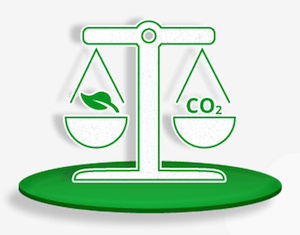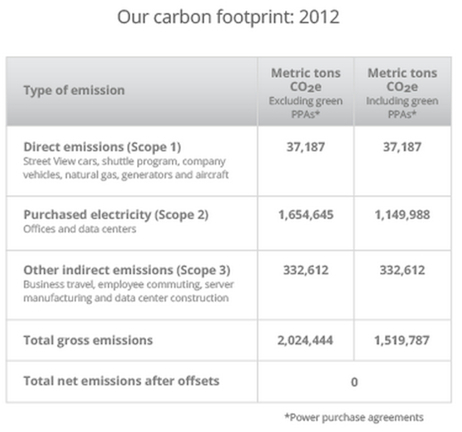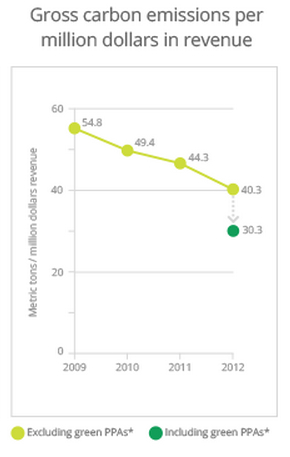Google Limits Carbon Footprint, Funds Climate Change Deniers
A champion of energy-efficient, environmentally-responsible computing, tech giant Google prides itself on "creating a better web that's better for the environment." The company announced last week that it had maintained its carbon neutral status for a sixth year and its 2012 emissions were down 9 percent compared to the year before. Google has worked hard to build its eco-friendly reputation. Now it jeopardizes that status by giving political contributions to climate change deniers.
 Last week Google's Carbon Czarina Jolanka Nickerman took to the company's Green Blog to discuss the latest carbon emissions numbers:
Last week Google's Carbon Czarina Jolanka Nickerman took to the company's Green Blog to discuss the latest carbon emissions numbers:
"We've continued to use more renewable energy, squeezed even more efficiency out of our operations and helped our customers reduce their own IT footprint," writes Nickerman.
"Google has been carbon neutral for six years," she continues. "This means that all of the work we do has a total carbon footprint of zero. This includes serving 100 billion search queries and 6 billion hours of YouTube videos a month, supporting 750 million Chrome users and delivering Google Maps in 194 countries. It also includes efforts such as developing self-driving cars and launching Wi-Fi-enabled balloons into the atmosphere."
While Google strives to promote energy-efficiency in all aspects of the business, most notably in its innovative datacenter designs, the company still accrues a carbon footprint comprised of direct and indirect emissions as well as purchased electricity. Currently, Google's operations are about one-third renewable-powered. To neutralize the carbon load of the non-renewable portion, Google invests in carbon offsets. The practice lets Google claim zero net carbon emission; however, Google's 2012 gross carbon emissions weigh in at 1.5 million metric tons of carbon dioxide.
 |
|
| The table shows Google's carbon footprint for 2012 with and without PPAs. Source: Google |
|
Google's gross 2011 carbon footprint was 1,677,423 metric tons of CO2e (Scope 1: 29,563, Scope 2: 1,439,703, Scope 3: 208,157). For 2012, the total is 1.5 metric tons. The 9 percent drop reflects the 2012 decision to include power purchase agreement (PPA) deductions. If PPA deductions are omitted (as they were in 2011), the total gross emissions for 2012 add up to 2,024,444 metric tons.
Nickerman explains:
"We're deducting these purchases according to new reporting guidance from the Carbon Disclosure Project. We continue to buy large amounts of renewable energy for our operations; to date we've contracted for over 330 MW of wind power in the US and Europe. For transparency's sake, we're also reporting our footprint without those purchases. We urge others to do the same, which is why we participate in the World Resources Institute Scope 2 accounting process. This helps to ensure greenhouse gas reporting remains transparent and meaningful."
 To put this in perspective, Google's total gross carbon emissions have actually gone up; however, relative to revenue, emissions have been on a downward slope since 2009. According to a company chart (left), metric ton emissions per million dollars in revenue fell from 44.3 in 2011 to 40.3 in 2012 (30.3 with PPA deductions).
To put this in perspective, Google's total gross carbon emissions have actually gone up; however, relative to revenue, emissions have been on a downward slope since 2009. According to a company chart (left), metric ton emissions per million dollars in revenue fell from 44.3 in 2011 to 40.3 in 2012 (30.3 with PPA deductions).
"For the fourth year in a row, we're emitting less carbon per million dollars of revenue," writes Nickerman. "This means that our footprint is growing more slowly than our business because we're able to get more done with each gram of carbon we emit."
Google's carbon czarina (czarista?) goes on to explain that the active Google user's monthly carbon footprint is about 8 grams, an amount that is equivalent to driving a car one mile. The hypothetical user is allotted 25 searches, 60 minutes of YouTube watching, a Gmail account as well as "other [Google] services."
While hyperscale cloud datacenters are big energy users, the transition to cloud may actually be a net energy saver. A growing body of research indicates that Internet-based computing (aka cloud computing) is more energy-efficient than traditional IT. A computing model created by Berkeley Lab (with funding from Google) suggests that the five million businesses using Google Apps have a combined energy savings that is greater than Google's carbon footprint.
Google has garnered high praise for its environmental leadership, with awards from the EPA and Greenpeace proudly displayed on its website.
Despite this healthy track record, Google's environmentally-friendly image sustained a hit last month when news came out that the company hosted a fundraiser for known climate change denier Senator James Inhofe, an Oklahoma Republican.
Dismissing climate change as a "hoax," the Senator has said, "CO2 does not cause catastrophic disasters … actually, it would be beneficial to our environment and the economy."
The month prior, Google contributed $50,000 for a fundraising dinner for the ultra-conservative Competitive Enterprise Institute, which attempts to discredit climate change scientists by suing them for fraud. So far, none of these lawsuits have been successful.
Google's actions have elicited strong criticism. "Google's motto is 'Don't Be Evil', but it is supporting one of the worst deniers of climate science in the world," reported the Climate Progress website.
A group of climate scientists who were part of Google's Science Communication Fellows program in 2011 voiced their concerns over the "troubling alliance" in an Aug. 1, letter to Chairman Eric Schmidt and CEO Larry Page.
"The political gridlock that has derailed efforts to address climate change in the US owes much to Senator Inhofe," the letter says. "His denial of the problem and fact-free assaults on the scientific community are designed to promote political dysfunction, to destroy the reputation of scientists, and to undermine our ability to find common ground."
They concluded: "There are times where companies like Google must display moral leadership and carefully evaluate their political bedfellows. Google's support of Senator James Inhofe's re-election campaign is one of those moments."
Google has not responded to specific complaints; however, an anonymous rep shared this canned statement with several news outlets:
"We regularly host fundraisers for candidates, on both sides of the aisle, but that doesn't mean we endorse all of their positions. And while we disagree on climate change policy, we share an interest with Senator Inhofe in the employees and data center we have in Oklahoma."
 |
|
| Aerial view of Google's Pryor, Oklahoma, datacenter | |
The company has built a substantial datacenter presence in Pryor, Oklahoma. The political spending is Google's way of guarding its investment by currying favor from area lawmakers.
Forecast the Facts, a group that fights climate misinformation, has accumulated some 150,000+ signatures protesting Google's funding of climate change deniers.
In describing the impetus for the petition, Forecast the Facts notes that "Google has been a corporate leader in fighting climate pollution. Its support for liars like Inhofe is a glaring mistake."
Google Chairman Eric Schmidt shouldn't need much in the way of convincing. Schmidt was railing against climate deniers during his company's "How Green is the Internet?" Summit on June 6. "You can lie about the effects of climate change," he quipped, "but eventually you'll be seen as a liar."










